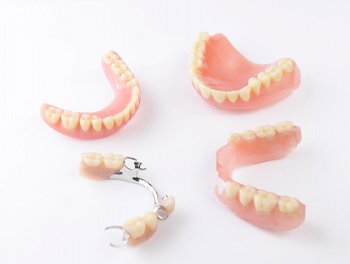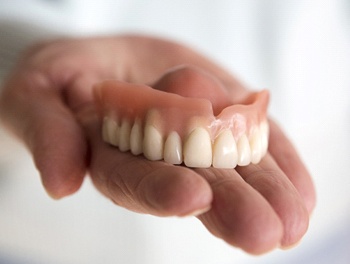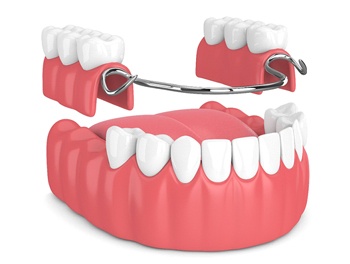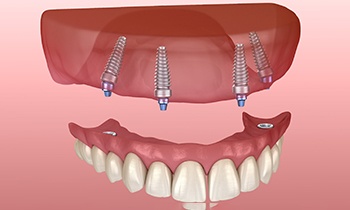
If you’re missing teeth, you may be considering various replacement options. Besides affecting your smile’s appearance, missing teeth can also cause other problems like unnecessary wear and tear on your remaining teeth, shifting teeth, difficulty with at-home oral healthcare, and so much more. Thankfully, Dr. Carolyn Molzahn, an expert dentist in Worthington, has a solution! She uses full and partial dentures to help patients who are missing all, most, or some of their teeth get a complete smile. Keep reading to learn more about the different types of dentures in Worthington.

Before discussing the different types, it’s important to know the basics. A denture is a set of prosthetic teeth attached to a plastic, gum colored base. A full denture replaces the patient’s entire smile, while a partial denture can complete the rest of your teeth while leaving your remaining healthy dental structure intact. Dentures can be held in place using various methods, but this will depend on your smile and needs. With proper care, your denture will last between 5 to 7 years, and it can even last longer if it’s supported by dental implants.

We offer full dentures for patients who are missing all or most of their teeth. If you still have some teeth remaining, we may remove them to accommodate your full denture. This replacement allows us to restore the appearance of your whole smile at once. Traditional dentures are held in place with suction, making them completely removeable. We will take impressions of your gums before creating your personalized denture for the best comfort and function. Even though you won’t have any natural teeth remaining, oral healthcare is still important. Brush your gums, tongue, and palate every morning before inserting your dentures for a comfortable and healthy wearing experience.

If you have some of your natural teeth remaining, we may recommend a partial denture if they are healthy enough. This option fills in the gaps in your smile like missing pieces to a puzzle. The result is a seamlessly complete, beautiful smile. Partial dentures are typically held in place with brackets or wires, and they can be removed for cleaning and maintenance.
Implant-retained dentures are quickly becoming our most popular option for full smile replacement because of their unique benefits. Combining dentures and dental implants, this replacement can restore an entire row of your smile at once with the strength, health, and security of dental implants. These are small posts made of titanium, which are surgically placed in the jawbone to act as artificial tooth roots. Titanium is biocompatible, allowing the implants to fuse to your jawbone for ultimate stability. Once placed, we can mount your custom-made denture on top of the implants. With this new smile, you can speak, smile, laugh, and eat all of your favorite foods without worrying about a shifting denture.
Does it sound like one of these options are right for you? Contact Dr. Molzahn today to get started.

Your dentures can serve you for many years with the correct care. Although they can’t get cavities, they require daily attention at home. Even if you don’t have any natural teeth left, you should still see your dentist every 6 months for a dental checkup. With the right care at home and regular dental appointments, you’ll keep your mouth healthy and promote the lifespan of your dentures.

Traditional partial and full dentures should be removed and rinsed off after eating. This will prevent a buildup of food debris and plaque that can lead to unpleasant odors and damage your dentures over time. Don’t use hot water to rinse them because it can cause them to warp.
Your dentures should be removed and brushed daily. Use a soft-bristled toothbrush and a mild hand soap to clean your dentures. Never use abrasive products because they can scratch your dentures, which can make them look discolored. Plaque can also get trapped in small spaces. Besides brushing your dentures, don’t forget to clean the inside of your mouth. Place your dentures in an overnight soaking solution to keep them clean and moist when you’re not wearing them. Rinse off any cleaning materials before putting them back in your mouth.
Accidents can happen. Although your dentures are durable, they can break if you drop them. Place a towel on the counter or underneath you just in case you drop your dentures. Always keep your dentures out of reach or animals and small children. Never let your dentures dry out because they can warp and crack.
Although no one wants to be caught without their teeth, you must remove your dentures at night. They restrict blood circulation to your gums. The soft tissues can become inflamed and tender if your gums aren’t given a break. Removing your dentures before calling it a night will keep your gums healthy to prevent infections that can harm your oral and general health.
Over time, it’s normal for your dentures to slip or irritate your gums because your mouth changes shape from bone loss. Your dentist can reline your dentures to maintain a snug fit to get the most from your new teeth. If you notice your dentures are damaged or broken, leave the mending for professionals. Never use adhesives, glue, or other items to repair your dentures.

You care for implant-supported dentures similar to your real teeth. Use non-abrasive dental products to brush your teeth twice daily. Use floss threaders or a waterflosser to clean beneath your denture every day. Raise your mouth with an antimicrobial mouthwash to kill bacteria left behind by your toothbrush and floss.

Dentures in Worthington can restore the beautiful, functional smile you deserve, but they are a big investment. Most patients have some concerns before they are ready to commit to them, but there isn’t any reason to worry. Your denture dentist will explain everything during your initial appointment. Here are the answers to a few frequently asked questions to ease any apprehensions while you wait for your consultation.
Your denture dentist in Worthington will advise you to wear your dentures for a full 24 hours after initially receiving them. After the first night, you will have to get in the habit of removing them before going to bed. Your dentures will restrict blood circulation to your gums. The soft tissues need time to recuperate and get the nutrients they need to stay healthy. If you don’t give your gums a break, sores, irritation, and infections can occur. Not to mention, your mouth is dark and moist, which is the ideal environment for harmful oral bacteria that can affect your general health and the lifespan of your prosthetic. Although no one wants to get caught without their teeth, it’s best to take them out and soak them in a cleaning solution overnight.
You have more options than ever when replacing your lost teeth. If you’re concerned about discomfort or a diminished taste in food using a denture that covers the palate, there are other styles to choose from, like one with a horseshoe shape. It will look like a lower denture or one used with dental implants, so it won’t cover the roof of your mouth.
Your dentures will mimic your real teeth, but they can’t be cleaned the same way. Abrasive dental products, like toothpaste, will leave small scratches on your dentures. They can tarnish the appearance of your new smile while also trapping food particles and bacteria that can lead to odors or damage your denture. It is better to use a soft-bristled toothbrush and mild hand soap or dishwashing liquid to clean them. You can also purchase cleaning kits designed for denture wearers. Don’t use hot water to rinse them because it can warp your denture.
Your denture will be durable, but accidents happen. If your denture breaks, don’t reach for superglue. Although it’s handy for fixes around the house, you’ll want to leave the mending to the professionals. Superglue contains chemicals that can cause allergic reactions or health issues. Not to mention, it doesn’t hold up well in moist environments, so the repair won’t last too long. Instead, contact our office for an appointment. We know you rely on your denture and can’t go without your teeth. We will get you into the office quickly to repair or replace your denture to restore your beautiful smile.